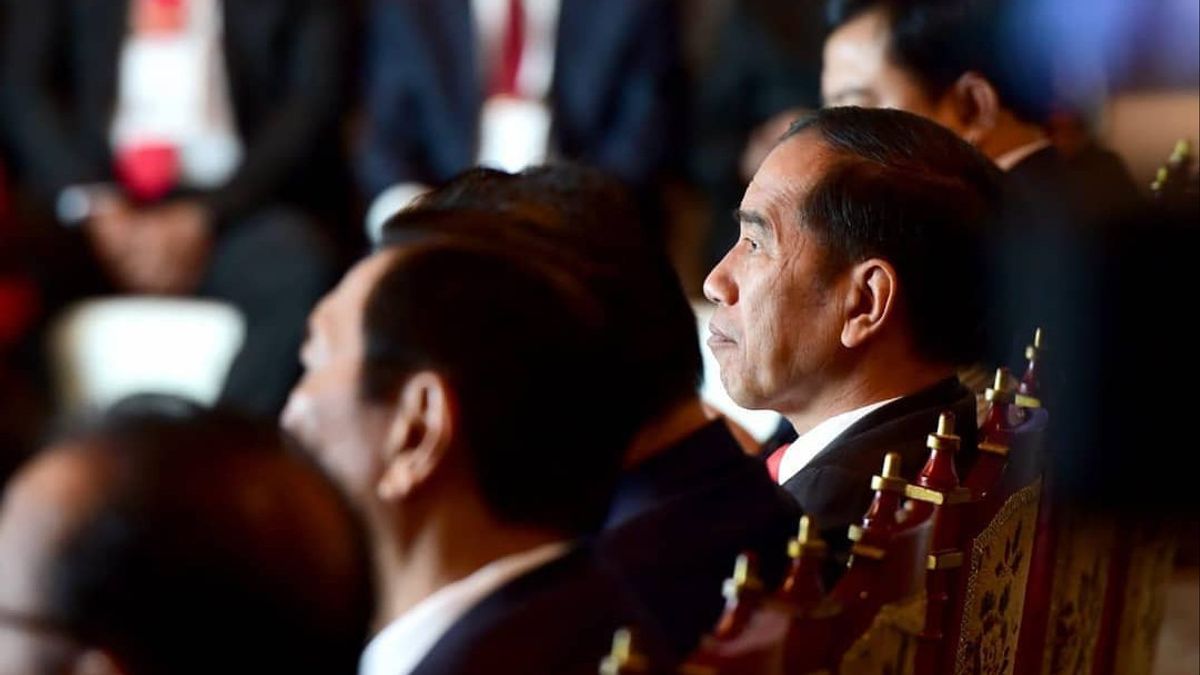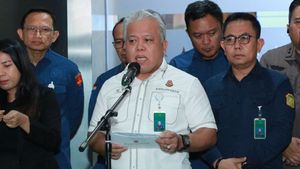JAKARTA - This country is lucky. In the midst of many governments in other countries that suppress workers through investment-oriented legal products or laws that are pro-corruption, Indonesia actually has a good-natured government. Even if there are several products of similar laws from other countries which point to the danger of the people, in fact they are just typos. We are lucky.
Coordinating Minister for Political, Legal and Security Affairs (Menkopolhukam) Mahfud MD is a true enlightener for the public. Her presence was clear. Regarding Article 170 of the Work Creation Omnibus Bill (Ciptaker) contains points that in substance give the president the authority to change the law through a Government Regulation (PP), according to Mahfud, it is a mistake and a mere typo.
Mahfud said that the Law could not be replaced by a PP. Only a Government Regulation in Lieu of a Law (Perppu) can, as the government has done several times from period to period. "If through the Perppu, it has always been (done). From the first until whenever possible. But, if the contents of the law are replaced by PP, it is not possible to replace them with Perpres (Presidential Regulation). Maybe it was a typo," said Mahfud some time ago.
As for Article 170 of the Work Creation Omnibus Bill, it reads:
Article 170
Paragraph (1)
In order to accelerate the implementation of the strategic work copyright policy as referred to in Article 4 paragraph (1), based on this Law, the Central Government has the authority to change the provisions of this Law and / or change provisions in the Law which are not amended in this Law. .
Paragraph (2)
The amendment to the provisions referred to in paragraph (1) shall be regulated by a Government Regulation, "reads Article 170 paragraph 2.
Paragraph (3)
(2) In the framework of stipulating the Government Regulation as referred to in paragraph (2), the Central Government may consult with the leadership of the People's Representative Council of the Republic of Indonesia.

Mahfud is not just an enlightener. It is also a calm medicine for the hearts of the people. A few days after the statement about a typo, Mahfud returned with a very reassuring statement. Mahfud said that technical errors in writing the draft bill were commonplace. So, society must understand. We have to calm down. No need to bother. The government is certainly on the right track: economic improvement.
"Yes, there is only one gate in the economy. Finally, there are improvements, there are mistakes. That's all. That's fine. It's normal that mistakes are made," Mahfud told reporters at the Presidential Palace, Central Jakarta, Tuesday , February 18th.
Not only Mahfud. Another member of integrity in the 2019-2024 Advanced Indonesia Cabinet is Yasonna Laoly. Complementing Mahfud, Yasonna also wisely suppressed the polemic by saying that there was no intention of the government to cheat by inserting the article. People who like suuzan need to step aside for a moment. Make way for all the truths conveyed by the Minister of Law and Human Rights (Menkum HAM).
According to Yasonna, the typo occurred in the drafting process of the bill before it was submitted to the DPR RI. So, Yasonna emphasized that now the responsibility to improve the draft lies with the DPR. It's no longer in the government. "Yes, yes, the PP can't go against the law ... There is no need to (repair it) because later in the DPR it will be fixed," said Yasonna, one of the best ministers in the Joko Widodo (Jokowi) administration.
Many reasons agree that the government has never had the slightest bad intention in the drafting of the Citaker Omnibus Bill. That the government is just wrong. Khilaf. After all, this kind of typo incident is not the first time. In the revision of Law Number 32 of 2002 concerning the Corruption Eradication Commission (KPK), for example.
At that time, a typing error was only known to the public after the draft KPK Bill was passed into the KPK Law through a plenary session at the Indonesian Parliament on September 17, 2019. This typographical error is contained in Article 29 which states that the KPK leadership must meet the minimum requirement of 50 years in numeric writing, while his written statement actually mentions 40 years. As a result, Jokowi had time to postpone the signing of the law.

A long attempt at fooling the public
We can see Mahfud and Yasonna and their statement as a remedy for peace and clarification of people's prejudices. But, in fact, political science says differently. Is "dumbing down", a term used to describe a situation when the government plays with the psychology of the masses to form a false reality in the heads of the people.
Political observer Ujang Komarudin also arrested the practice of dumbing down in this typo case. According to Ujang, the government has made a structured effort to gradually master the psychology of the masses by diverting it. Today society may break up with all its protests and criticisms. However, when this pattern continues, the psychology of the people will eventually be distracted by informing them.
As Mahfud said, typos in the process of drafting laws are common. The usual. "The community is then confused (by reasons of technical errors). As a result, the community is not critical (in the future)," said Ujang, in a conversation, Tuesday, February 19.
According to Ujang, the ultimate goal of the dumbing down practice is to weaken public control. Apathy increased, criticism decreased. Weakened public control will make the government more free to pass legal products or policies that are actually problematic.
"So, if this happens (criticism drops and apathy increases), the government and the DPR can just pass the bill because there is no control from the public," said Ujang.

The practice and purpose of government dumbing down today is also described by Ivo Mosley in his writing. He described dumbing down as a long-term attempt by the government to control its people through psychological interventions.
"The state takes a kind of abstract reality in our minds, makes us stop questioning the things that people do with the power we give (through the democratic process) and let them exercise power over us," he added in an article entitled Dumbing Down Democracy. was part of an essay book entitled Dumbing Down: Culture, Politics and the Mass Media released in 2000.
The English, Chinese, Japanese, Arabic, and French versions are automatically generated by the AI. So there may still be inaccuracies in translating, please always see Indonesian as our main language. (system supported by DigitalSiber.id)













